

Features
65 Hearty Cheers To Prof. Bart Nnaji, Aka Ji Oku, Nigeria’s Former Minister Of Power
Japhet Usoro
“Greatness lies, not in being strong, but in the right using of strength; and strength is not used rightly when it serves only to carry a man above his fellows for his own solitary glory. He is the greatest whose strength carries up the most hearts by the attraction of his own.”
The above quote from Henry Ward Beecher aptly captures the unique and sterling attributes of one of Nigeria’s greatest, former Minister of Power, Professor Bart Okechukwu Nnaji, an embodiment of humility and class, who Tuesday (yesterday) to the glory of God, marked his 65th birthday.
Professor Bart O. Nnaji is the Chairman/CEO of Geometric Power Limited, the first indigenously owned private sector power company in Nigeria. Geometric Power develops and invests in power plants, sub stations, electricity distribution infrastructure and gas pipelines.
 Prof. Bart Nnaji
Prof. Bart Nnaji
Prof. Nnaji served as the Federal Minister of Power from 2011to 2012. Prior to that, he served as Special Adviser to the President on Power & Chairman, Presidential Task Force on Power from 2010 to 2011. During this period, he developed the Roadmap for power reform in Nigeria. He subsequently led the implementation of the Power Roadmap as well as privatization of Power Holding Company of Nigeria (PHCN), the state-owned utility monopoly as Honourable Minister of Power. During his tenure as Minister, he was a member of the National Economic Management Team, chaired by the President and includes Senior Ministers and select Captains of Industry. He served as a member of the Presidential Advisory Council from March 2010 to January 2011 and was the Chairman of the Power committee of the Council. In 1993, he served as Federal Minister of Science and Technology of Nigeria. Prior to his appointment, the Ministry had been abolished by Government. He re-established the Ministry to sustainability to date.
In 2009, he was appointed by then President Yar’Adua as a member of the National Energy Council (the apex decision making body on energy in Nigeria). He was the pioneer President of the Independent Power Providers Association of Nigeria (IPPAN). He served on the Governing Board of the Nigerian Merit Board from 2008 to January 2014.
Prof Nnaji was a Professor of Mechanical and Industrial Engineering at the University of Massachusetts at Amherst from 1983 to 1996. He subsequently became the Alcoa Foundation Professor of Engineering at University of Pittsburgh, Pennsylvania from 1996 to 2003. In 2003, he served as the William Kepler Whiteford Professor of Engineering at University of Pittsburgh where he also spearheaded the creation of the U.S. National Science Foundation (NSF) Centre for e-Design as a multi-campus NSF Center of Excellence in the United States of America and served as its first Director. He resigned as William Kepler Professor of Engineering and Director of the U.S. NSF Center for e-Design in 2007.
Prof Nnaji also served as Principal or Co-Principal Investigator on over $50 million research sponsored by the US National Science Foundation, NATO, US Department of Defence, NASA, GE, Boeing, IBM, Ford Motor, and many other major companies.
He has published 5 books and over 100 technical articles. His book, Computer Integrated Manufacturing and Engineering, won the 1994 world best text book prize for Manufacturing Engineering. He was the founding Editor-in-Chief of the International Journal of Design and Manufacturing and has served as Editor of many professional journals.
 Prof. Bart Nnaji as a young man
Prof. Bart Nnaji as a young man
He has also served as Chairman of many conferences including the World Conference on Robotics Research (1991); the UN Institute for Training and Research Workshop for diplomats from various parts of the world at the UN headquarters on debt and financial management for developing countries (2001 and 2002).
He has received numerous awards including: 5 honorary doctorates from prestigious universities; Nigeria’s highest intellectual national honour — Nigerian National Order of Merit (NNOM); the National Honour – Commander of the Order of Niger (CON); Fellow of Nigerian Academy of Science; Fellow of Nigerian Academy of Engineering (FAEng); The U.S. Secretary of State’s Distinguished Public Service Award (1995); Distinguished Scientist Award by the World Bank – IMF Africa Group (October 1998); West African Power Industries Life-time Achievement Award for 2014; among others.
Prof. Bart Nnaji, a global citizen, hails from Umuode in Nkanu East Local Government Area of Enugu State.
Happy birthday Aka Ji Oku of Igboland, Agu Na Eche Ibe, Onwa Nkanu! from all of us at GMTNews
Japhet is Energy correspondent @GMTNews
Features
South-East 6th State: Formidable Hurdles After National Assembly Committee Approval
The National Assembly Joint Committee on Constitution Review has approved an additional state for South-East Nigeria. If all constitutional steps are completed, the South-East 6th State will mark the first state creation under a democratic government — a landmark for President Tinubu’s administration.

South-East 6th State: Hurdles After National Assembly Committee Approval
GMT News – Abuja | October 25, 2025
Nigeria may be on the brink of making democratic history following the approval of the South-East 6th State by the National Assembly Joint Committee on Constitution Review. The landmark development, which emerged from the committee’s retreat in Lagos on Saturday, signals renewed hope for the South-East geopolitical zone, which has long agitated for equity in the country’s state structure.
Complementing this momentum is Senator Ned Nwoko’s strategic foresight in navigating the legislative process and securing the support of more than 80 senators for the creation of a sixth state for the South-East. His consistent campaign and stakeholder mobilisation have placed the additional state for South-East agenda firmly on the national map.
The committee’s decision has sparked jubilation across the region and generated nationwide discussion around what many describe as a long-overdue correction of Nigeria’s political imbalance. The recommendation for the South-East 6th State has dominated national headlines and social media trends, symbolising the region’s collective aspiration for fair representation in the Nigerian federation.
According to the National Assembly confirming the approval, the joint committee – comprising members from both the Senate and the House of Representatives – unanimously endorsed the proposal after years of consultations, public hearings, and memoranda from stakeholders across the country. The South-East, currently with five states – Abia, Anambra, Ebonyi, Enugu, and Imo – has remained the only zone without six states. The proposed additional state for South-East aims to address this disparity.
However, while the development marks an important milestone, analysts emphasize that the committee’s approval does not yet amount to full constitutional creation of a state. Nigeria’s 1999 Constitution, under Section 8, stipulates a rigorous procedure for state creation. It begins with a formal request supported by at least two-thirds of representatives of the affected area, followed by endorsement by two-thirds of members of both chambers of the National Assembly. Thereafter, two-thirds of the 36 State Houses of Assembly must also approve the proposal before it is forwarded to the President for assent.
In essence, the joint committee’s approval represents only the first hurdle in a series of constitutional steps required to establish the new state. Yet, the symbolic importance of this progress cannot be overstated. For the first time in Nigeria’s democratic history, a civilian-led legislature is advancing a process that has historically been the preserve of military regimes.
If the creation of an additional state for South-East succeeds, it will be a landmark achievement for the Tinubu-led democratic government, marking a decisive break from the pattern of state creation through decrees by successive military rulers. Between 1967 and 1996, Nigeria’s internal map was redrawn by four military heads of state.
General Yakubu Gowon began the process in 1967 when he replaced the four regions with 12 states. General Murtala Mohammed increased them to 19 in 1976, while General Ibrahim Babangida expanded the number to 21 in 1987 and later to 30 in 1991. Finally, General Sani Abacha created six more states in 1996, bringing the total to 36. Since the return to democracy in 1999, no civilian administration has created a new state despite numerous proposals and public demands.
Observers say this approval of South-East 6th state gives President Bola Ahmed Tinubu a unique opportunity to make history. If the constitutional process is concluded under his administration, it would not only strengthen Nigeria’s democratic credentials but also reaffirm Tinubu’s commitment to inclusivity, equity, and federal balance — key pillars of his governance philosophy.
A member of the committee who spoke with GMT News under anonymity described the decision as “a bold step toward justice and fairness.” He noted that the South-East had been “unjustly shortchanged” in past exercises, adding that the new effort “will give the region a fair voice in national decision-making and restore a sense of belonging.”
Public Affairs experts, however, caution that the process ahead remains steep. Dr. Maxwell Menkiti Ngene of Enugu State Science and Technology, ESUT, a public affairs analyst, noted that “state creation is not just a political gesture – it’s a constitutional relay that requires wide consensus.” He stressed that while the National Assembly Joint Committee’s approval of an additional state for South-East was commendable, the hardest part would be securing the support of two-thirds of the State Houses of Assembly across Nigeria.
Despite the hurdles, optimism runs high in the South-East. Leaders of thought, traditional rulers, and socio-political organizations like Ohanaeze Ndigbo and Ndi Na-Asu-Bia Socio-Cultural Organisation have expressed satisfaction with the development. They describe it as a long-awaited recognition of the region’s need for equal representation and an end to structural imbalance that has persisted for nearly six decades.
Political commentators also argue that beyond representation, a new state in the South-East could reshape the region’s developmental trajectory. With an additional state comes increased federal allocation, infrastructure opportunities, and political appointments – factors that could stimulate growth and enhance the competitiveness of the South-East within the Nigerian federation.
For President Tinubu, whose administration has emphasized national unity and inclusiveness, the realization of this proposal – South-East 6th State – could serve as a defining democratic legacy. If achieved, it would be the first time a Nigerian president – operating within constitutional democracy – successfully oversees the creation of a new state.
The approval of South-East 6th state may still face legislative and political tests, but its broader significance already resonates. It rekindles hope that Nigeria’s democracy can evolve beyond military precedents, driven instead by negotiation, representation, and rule of law.
Beyond his legislative efforts, Senator Ned Nwoko’s advocacy reflects a broader moral vision anchored on national balance and unity. His call for an additional state in the South-East transcends regional sentiment. By championing dialogue, research-backed proposals, and bipartisan collaboration, Nwoko has emerged as one of the most consistent voices reminding Nigerians that inclusivity remains the soul of genuine democracy. Time for South-East 6th State is now.
As the process moves to the next stages – National Assembly debate, State Assemblies’ concurrence, and eventual presidential assent – Nigerians are watching closely. Should all conditions be met, the South-East may finally welcome its sixth state, and the Tinubu government may inscribe its name indelibly in Nigeria’s democratic history. GMTNewsng
Features
Tinubu Commissions Renovated National Theatre, Renames It Wole Soyinka Centre
President Bola Tinubu commissions the renovated National Theatre in Lagos, renamed as the Wole Soyinka Centre for Culture and the Creative Arts. The ₦68 billion project revives Nigeria’s cultural landmark and honours Nobel Laureate Wole Soyinka.
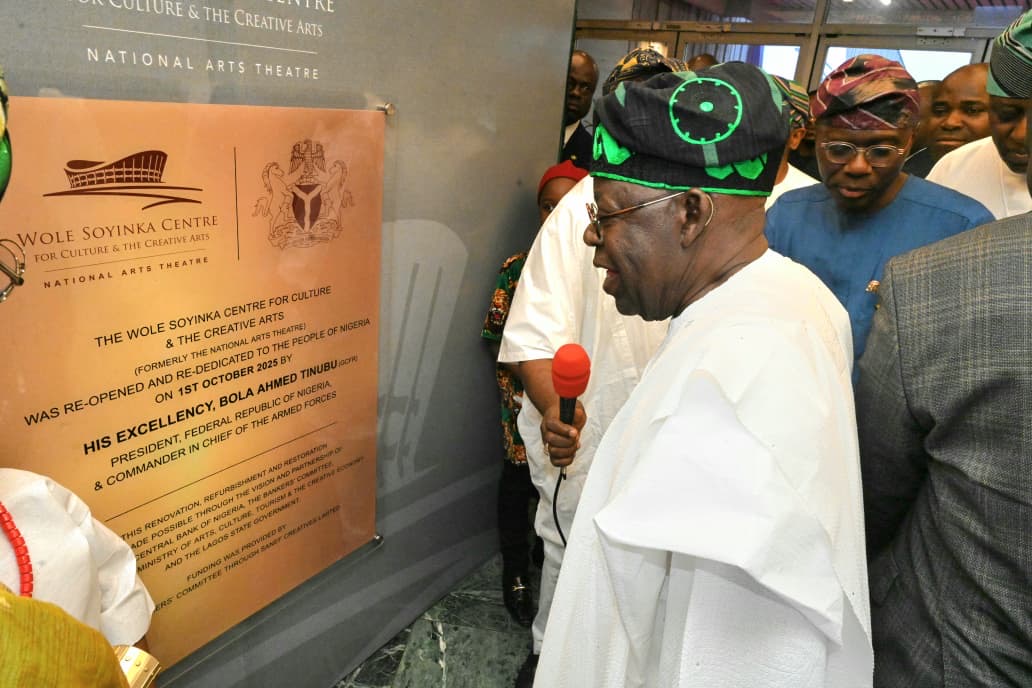
LAGOS, October 1, 2025 – President Bola Ahmed Tinubu has said that renaming the renovated National Theatre after Nobel Laureate Professor Wole Soyinka was a befitting way to honour the legacy of a man whose works have placed Nigeria on the global stage in the creative industry and human rights advocacy.
President Tinubu made this known on Wednesday at the official inauguration of the newly renovated National Arts Theatre, Iganmu, Lagos, as part of activities marking Nigeria’s 65th Independence Anniversary. The iconic edifice was originally built in 1976.
He expressed confidence that the rebirth of the theatre would help revive the promotion of arts, culture, and the creative economy in Nigeria.
In July 2024, President Tinubu renamed the theatre the Wole Soyinka Centre for Culture and the Creative Arts in honour of Nigeria’s Nobel Laureate, who was also a guest of honour at the event.
“Uncle Wole Soyinka is one of the most talented and creative minds. I remember your contribution to our struggle, nation-building, and freedom. You are one of the world’s greatest assets. It could not have been anyone else, and I knew you would not disobey this President,” President Tinubu said.
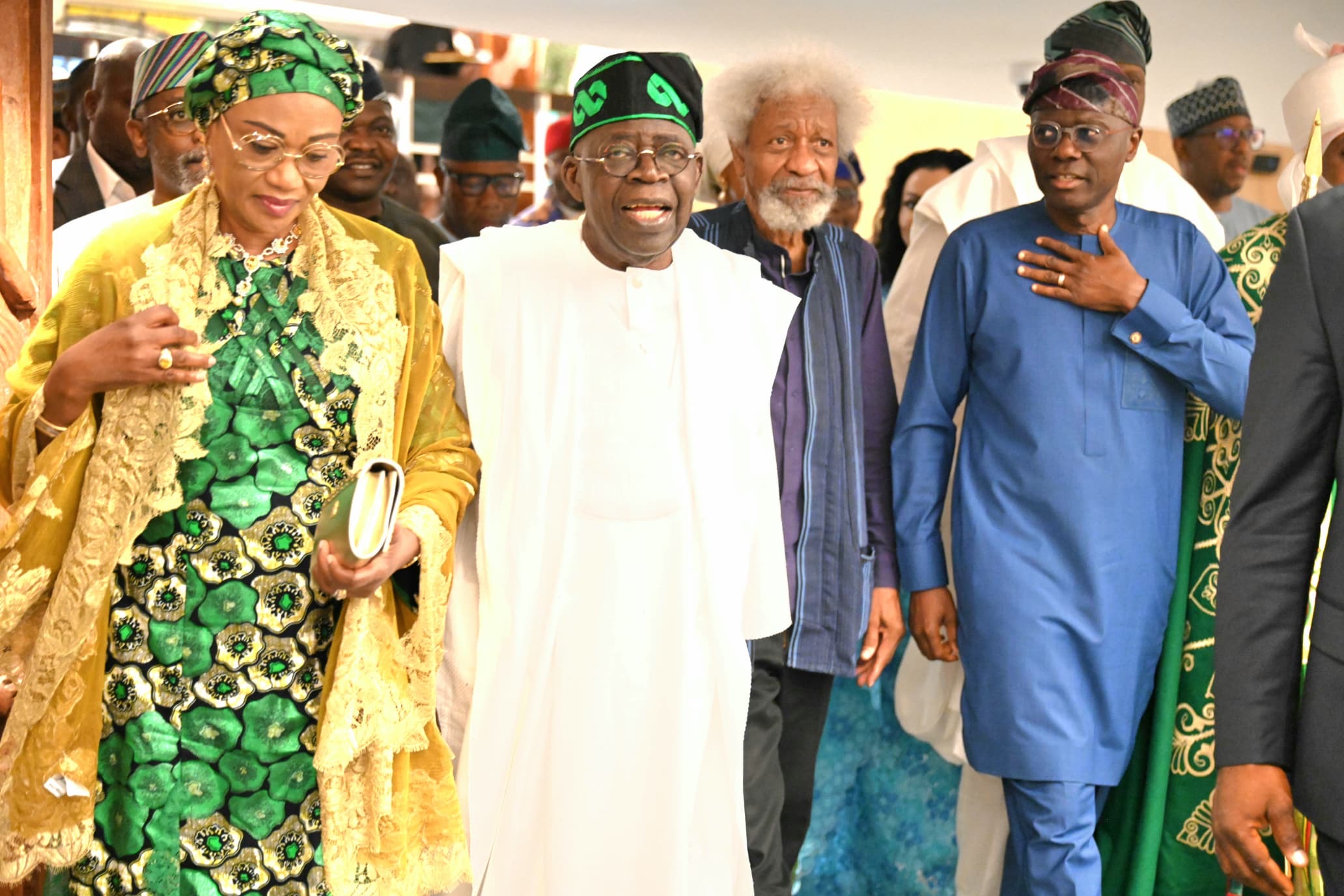 L-R: Prof. Wole Soyinka; Lagos State Governor, Babajide Sanwo-Olu; President Bola Ahmed Tinubu; and First Lady, Senator Oluremi Tinubu, during the commissioning of the renovated Wole Soyinka Centre for Culture and the Creative Arts, formerly known as National Arts Theatre, Iganmu, Lagos. Wednesday, October 1, 2025
L-R: Prof. Wole Soyinka; Lagos State Governor, Babajide Sanwo-Olu; President Bola Ahmed Tinubu; and First Lady, Senator Oluremi Tinubu, during the commissioning of the renovated Wole Soyinka Centre for Culture and the Creative Arts, formerly known as National Arts Theatre, Iganmu, Lagos. Wednesday, October 1, 2025
He further urged Nigerians, both at home and abroad, to refrain from speaking ill of the country, stressing that the nation is destined for greatness.
“This is a country of very proud people. We know what we are. It is about us believing in ourselves. From our parents, we inherited a nation of great, confident, and dedicated people. This country will succeed. Let us enjoy the glory. Lift Nigeria, believe in Nigeria. Put Nigeria first,” President Tinubu counselled.
The President commended Lagos State Governor Babajide Sanwo-Olu, the CBN Governor, Olayemi Cardoso, and the Bankers’ Committee, which contributed N68 billion towards renovating the theatre.
He also tasked the CBN Governor to institute an endowment fund for its maintenance.
Tinubu further urged the managers of the theatre to create jobs, prevent the facility from degenerating as it had in the past, and preserve it as a living legacy in honour of Professor Soyinka.
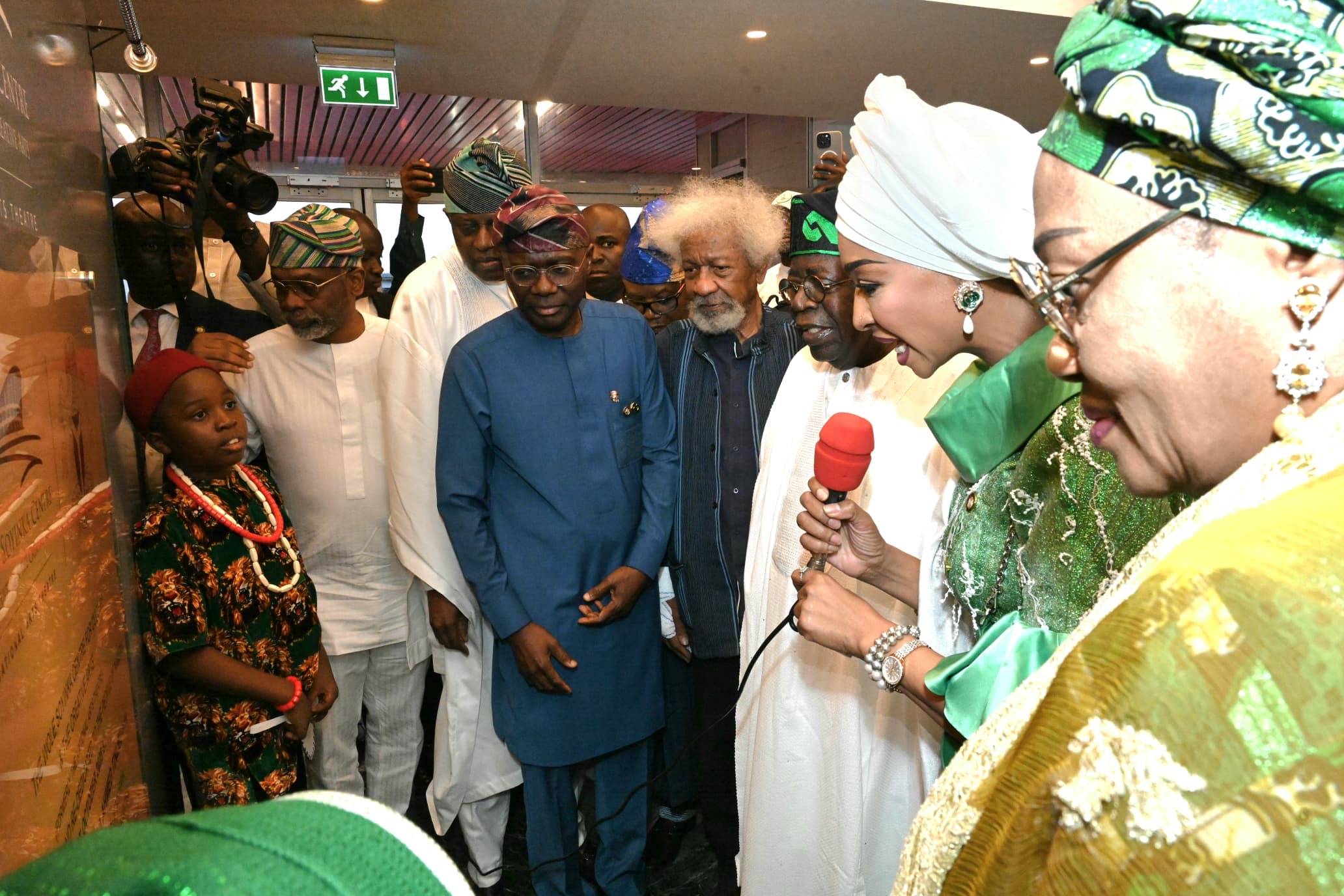 L-R: Chief of Staff to the President, Femi Gbajabiamila; Lagos State Governor, Babajide Sanwo-Olu; Prof. Wole Soyinka; Minister of Art, Culture and the Creative Economy, Hannatu Musawa and the First Lady, Senator Oluremi Tinubu, during the commissioning of the renovated Wole Soyinka Centre for Culture and the Creative Arts, formerly known as National Arts Theatre, Iganmu, Lagos. Wednesday, October 1, 2025
L-R: Chief of Staff to the President, Femi Gbajabiamila; Lagos State Governor, Babajide Sanwo-Olu; Prof. Wole Soyinka; Minister of Art, Culture and the Creative Economy, Hannatu Musawa and the First Lady, Senator Oluremi Tinubu, during the commissioning of the renovated Wole Soyinka Centre for Culture and the Creative Arts, formerly known as National Arts Theatre, Iganmu, Lagos. Wednesday, October 1, 2025
Governor Babajide Sanwo-Olu of Lagos State lauded the Federal Government under both the Late President Muhammadu Buhari and President Tinubu, as well as the Central Bank of Nigeria, for reviving the theatre after years of neglect.
He added that the Lagos State Government also contributed to the renewal by providing additional land and constructing a railway station near the edifice to improve access.
“We gather not only to witness the commissioning of a renovated edifice, but to celebrate the rebirth of a national icon—the National Arts Theatre, now rightfully renamed the Wole Soyinka Centre for Culture and Creative Arts.
“This landmark is more than concrete and steel; it is the heartbeat of our nation’s creative soul. It stands as a reminder that culture is not an accessory to development; it is the foundation upon which identity, unity, and progress are built,” Sanwo-Olu said.
Minister of Arts, Culture, Tourism, and Creative Economy, Hannatu Musawa, described the commissioning as a turning point for Nigeria’s cultural and creative industry and a rebirth of the nation’s foremost cultural landmark.
“We are privileged to have a President who is intentional about establishing a Ministry dedicated solely to the creative industry. It has never been done in Nigeria’s history. We also have a President passionate about economic and financial empowerment,” Musawa stated.
Professor Wole Soyinka expressed gratitude to the President and the CBN for reviving the National Theatre, admitting that he never thought it could be salvaged given its state of decay during his last visit.
He explained that he initially had reservations about the theatre being named after him, having previously criticised the renaming of monuments after living leaders and prominent figures.
He, however, said President Tinubu made it impossible for him to reject the honour.
CBN Governor Olayemi Cardoso noted that the renovated edifice now features world-class halls, exhibition spaces, cinema halls, and modern infrastructure.
He added that the project was inspired by the President’s vision to preserve Nigeria’s cultural heritage and project its creative influence globally.
“It was also to honour Nigeria’s artistic heroes and emphasise the potential of the creative industry to drive economic growth and diversification,” Cardoso said.
The event which featured thrilling performances by the National Troupe of Nigeria and others, had the First Lady, Senator Oluremi Tinubu, Senate President Godswill Akpabio, Speaker of the House of Representatives Tajudeen Abbas, among other distinguished personalities in attendance. GMTNewsng
Features
Aviation Summit in Enugu: Stakeholders Urge Igbo Youths to Embrace Aviation; Ifechukwu Uyammadu, 18, Crowned Face of Eastwing 2025
At the South-East Aviation Summit in Enugu, stakeholders and lawmakers urged Igbo youths to embrace careers in aviation to tackle unemployment and drive growth. The event also saw 18-year-old Ifechukwu Uyammadu crowned Face of Eastwing 2025, with a scholarship to pursue aviation studies.
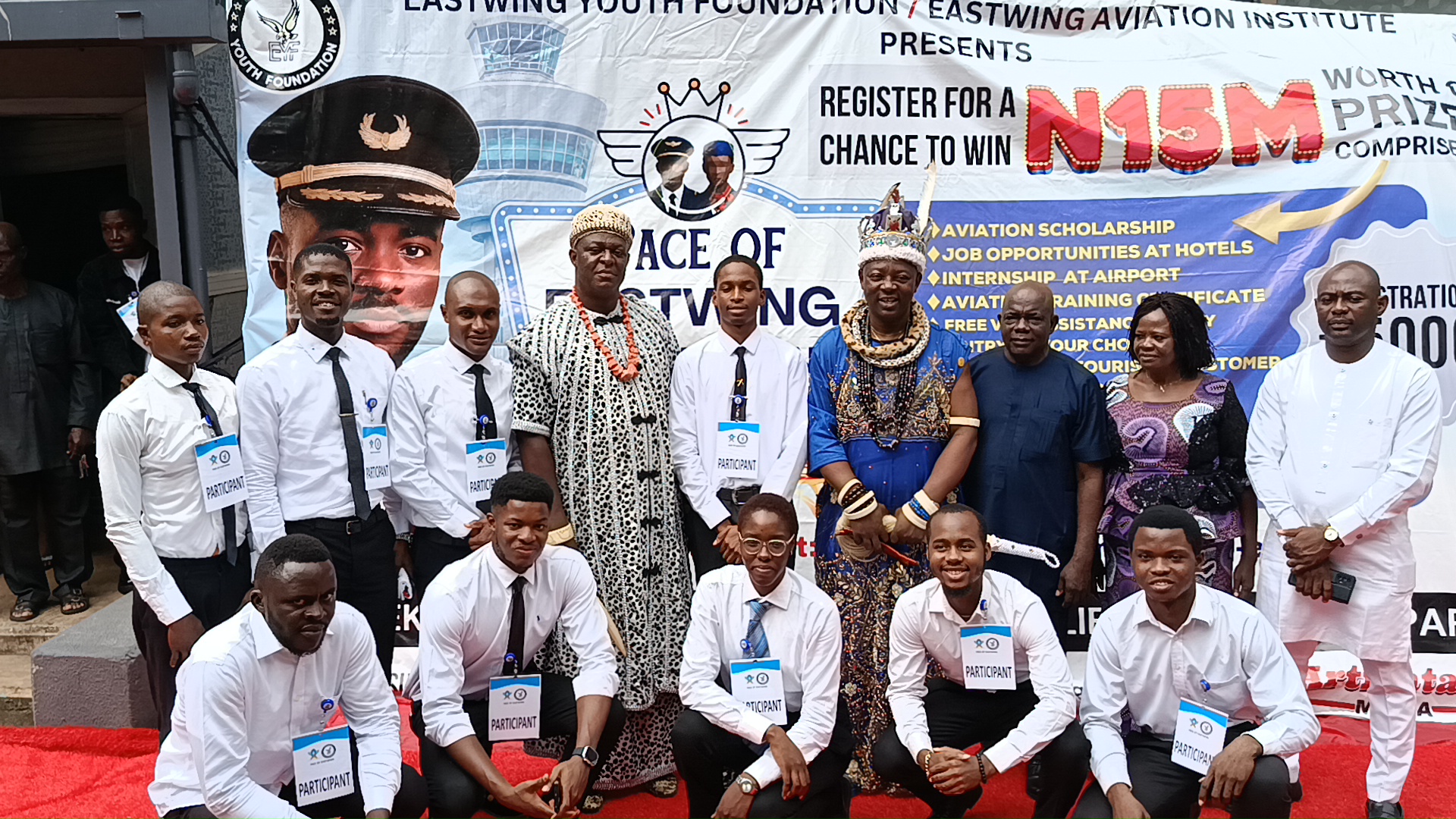
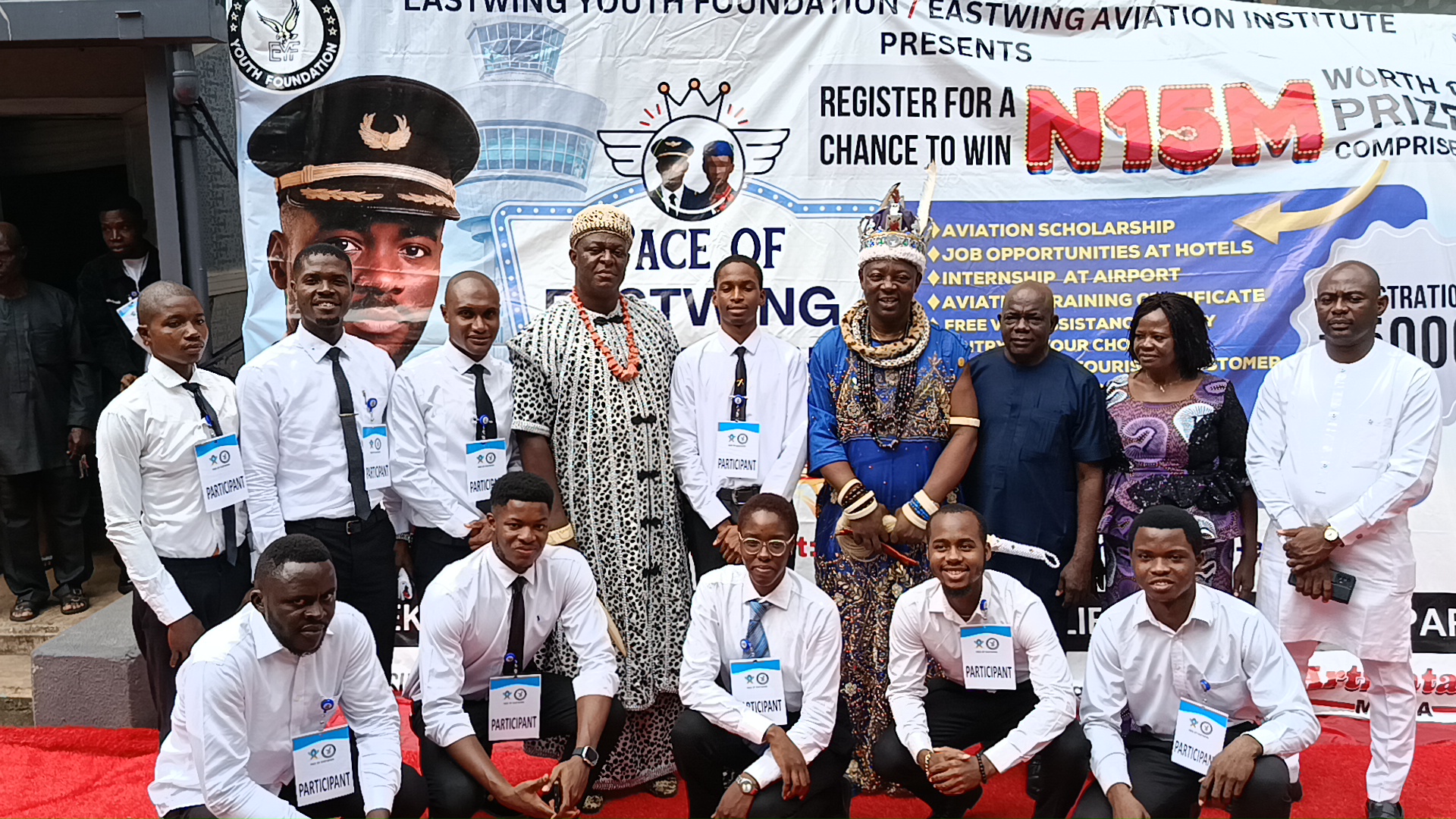
ENUGU, September 21, 2025 – In a resounding call for youth empowerment, stakeholders, traditional rulers, lawmakers, and community leaders across the South-East have urged young people in the region to seize opportunities in the aviation sector as a pathway to reduce unemployment, foster innovation, and drive regional development. The message came during the South-East Aviation Summit and Face of Eastwing 2025 Competition, organized by the Eastwing Aviation Institute, Enugu, through its Eastwing Youth Foundation.
The event, held on Saturday in Enugu, was not only a platform to spotlight aviation’s transformative potential for Nigeria’s youth but also an occasion to celebrate emerging talent, with 18-year-old Ifechukwu Uyammadu unveiled as the winner of Face of Eastwing 2025. The teenager’s victory was crowned with a full scholarship to study any aviation course of his choice at the institute, symbolizing a new era of opportunity for the next generation.
Aviation as a Tool for Youth Empowerment
Declaring the summit open, the Chairman of Enugu State Traditional Rulers Council, Igwe Samuel Asadu, emphasized that the South-East should not lag in aviation training and careers. He described aviation as a field where youths from other regions were already excelling and called on governments, private investors, and philanthropists in the South-East to sponsor young people into the industry.
Asadu commended the founder of Eastwing Aviation Institute, Dr. Christopher Edeh, for establishing the school in Enugu, noting that it placed world-class aviation training within the reach of South-East youths. According to him, the summit was a “game-changing event,” showing that what could be found in major cities across the world was now available in the region.
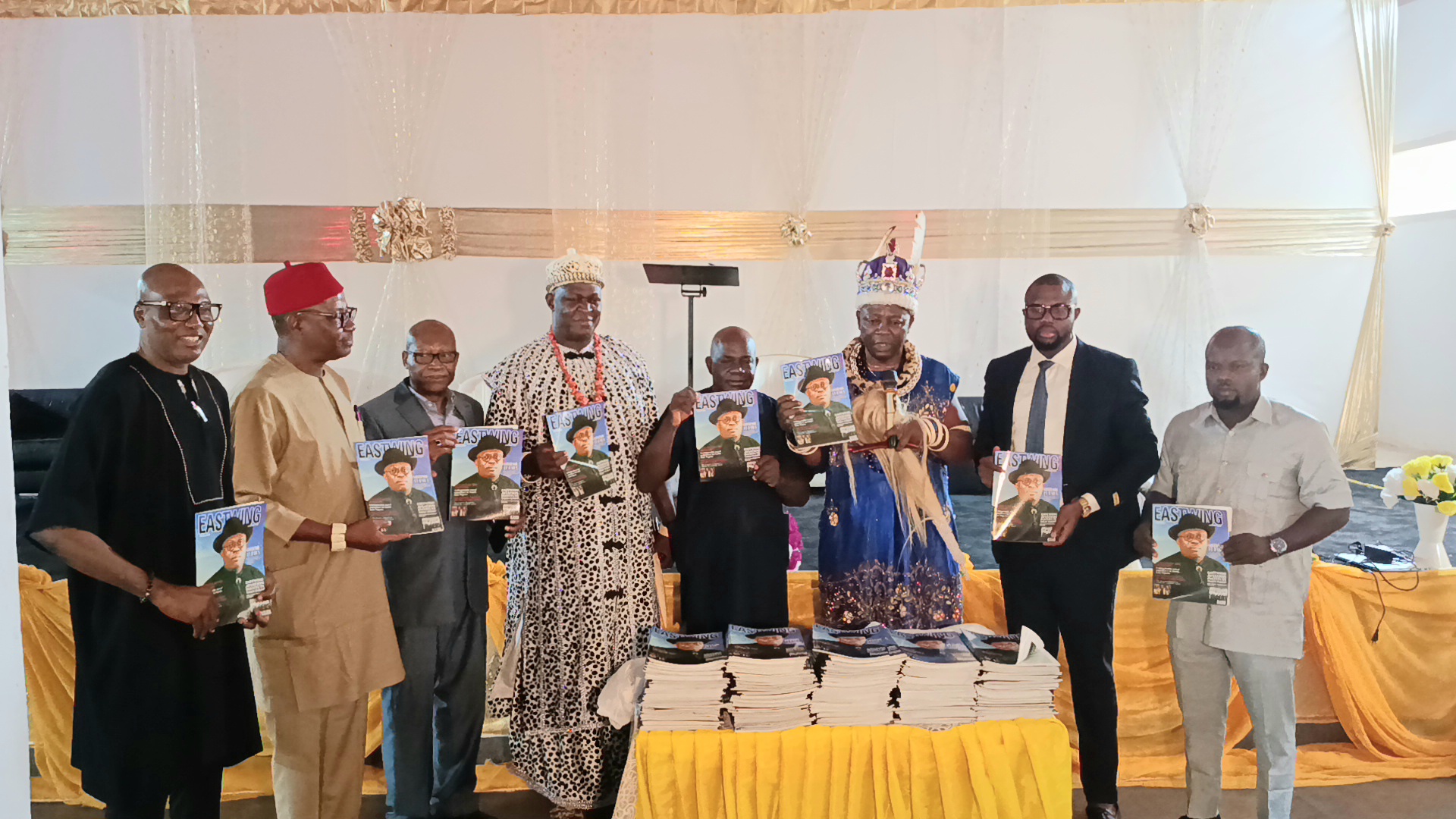
Backing this view, the Deputy Provost of Eastwing Aviation Institute, Dr. Segun Babalola, warned that the South-East risked falling behind if its youths failed to key into aviation. He expressed concern that fewer than 10 per cent of Igbo youths had shown interest in the industry, compared with other regions where large numbers were already trained and employed in aviation.
Babalola explained that aviation had evolved far beyond flight operations, now touching research, technology, logistics, and global trade. He stressed that societies without human development in aviation would find it difficult to remain competitive on the world stage.
Political Commitment to Youth Development
One of the key voices at the summit was Mr. Raymond Okey Ugwu, Chairman of the House Committee on Youths in the Enugu State House of Assembly, who used the platform to rally young people in the South-East to embrace aviation. Ugwu argued that aviation held the promise of massive job creation, technological advancement, and sustainable development for the region if properly harnessed.
Ugwu, who pledged legislative backing for youth-focused aviation training, noted that the summit was a rare opportunity for Igbo youths to reimagine their future. He stressed that the state assembly would continue to partner with institutions like Eastwing to ensure more scholarships, skill-acquisition programs, and policy frameworks that encourage private-sector participation in youth training.
 Igwe Asadu (R) in a handshake with Ifechukwu Uyammadu, the winner of the Face of Eastwing Aviation 2025.
Igwe Asadu (R) in a handshake with Ifechukwu Uyammadu, the winner of the Face of Eastwing Aviation 2025.
“By equipping our young people with aviation skills, we are not only addressing unemployment but also positioning the South-East to become a hub for innovation and global competitiveness. The aviation industry is expanding, and our youth must be at the forefront of that growth. This is why we, as lawmakers, will continue to push for policies and partnerships that give our young people access to this golden opportunity,” Ugwu said.
Local Leaders Align with the Vision
The summit also drew commitments from local government leaders. The Chairman of Enugu East Local Government Council, Engr. Beloved-Dan Anike represented by his deputy Engr Kingsley Obi Anike, announced that his administration would partner with the institute to train youths from his area, describing human capital development as a top priority.
Similarly, the Traditional Ruler of Umuisu Autonomous Community, Igwe Sunday Nwobodo, who was honored with a leadership award during the event, urged young people to embrace the institute’s soft skills training in aviation. Nwobodo pledged to continue supporting initiatives that empower youths and applauded Eastwing for setting the pace in private-sector-driven aviation education in the South-East.
Aviation Is About People, Not Just Machines
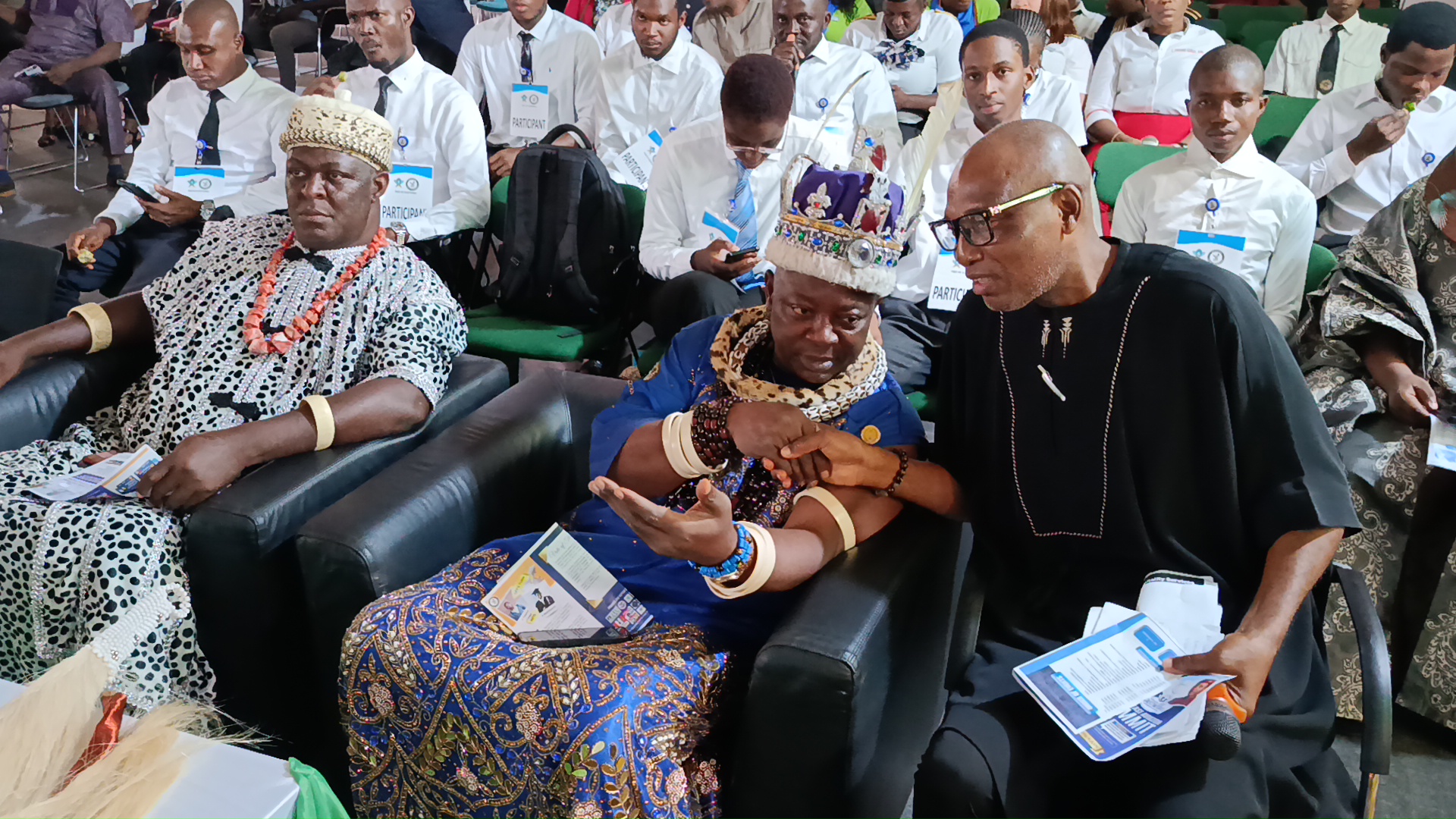
In his keynote address, Dr. Christopher Edeh, founder of Eastwing Aviation Institute, explained that aviation was not merely about machines, engines, or infrastructure but about people—their dreams, resilience, and pursuit of excellence. He reminded the audience that every pilot, engineer, air traffic controller, and aviation administrator once began as a dreamer, and that nurturing those dreams was key to regional development.
Edeh described Eastwing as a vision born out of determination, partnership, and faith in human capacity building. Today, he said, the institution stands as the only privately-owned aviation training hub in the South-East, a milestone that should inspire confidence in young people and attract greater support from the public and private sectors.
“Human development is the true engine that propels aviation forward. By investing in our youths, we are building the wings of collective progress, not only for Enugu State but for the entire South-East. Aviation has a place for everyone, and this institute is determined to help our young people find their space in this global industry,” Edeh remarked.
Face of Eastwing 2025: A New Star Emerges
The emotional highlight of the evening was the unveiling of 18-year-old Ifechukwu Uyammadu as the winner of the Face of Eastwing 2025 Competition. Beaming with excitement, Uyammadu described his win as both an honor and a responsibility to inspire other young people in the region.
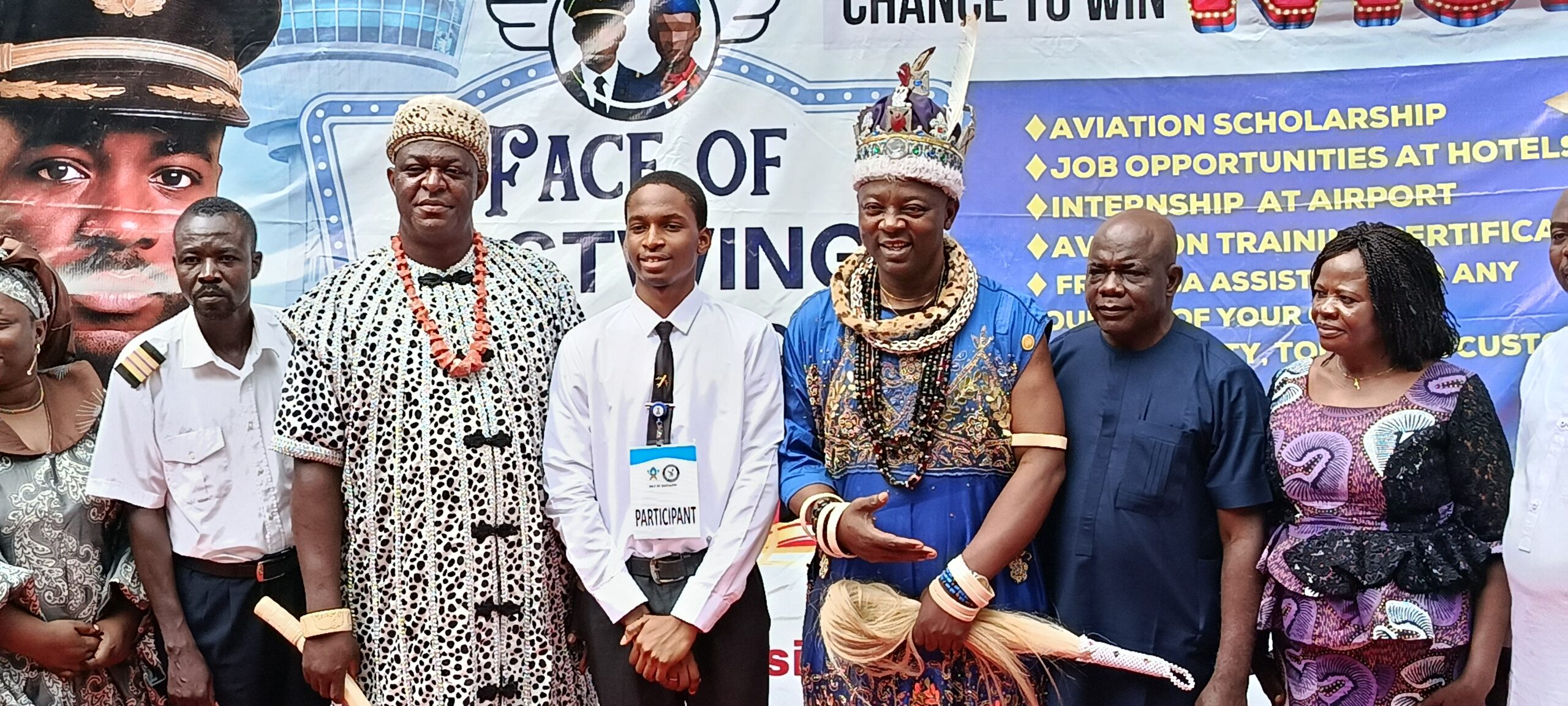
According to him, winning the competition underscored the importance of resilience, self-belief, and hard work. “This is more than just a crown; it is an opportunity to show that young people from the South-East can dream big and achieve in fields that were once thought to be out of reach. With the scholarship I have been awarded, I intend to pursue my passion in aviation and become a role model for others who aspire to take this path,” Uyammadu said.
His victory was greeted with cheers and admiration, as participants and dignitaries hailed the competition for blending youth empowerment with the glitz of fashion, culture, and talent display.
Awards, Magazine Launch, and Cultural Performances
Beyond speeches and competitions, the summit featured other memorable moments. The Eastwing Aviation Institute Magazine was launched, serving as a new platform to document aviation trends, youth success stories, and the progress of the institute. Several leadership awards were presented to individuals and organizations that had contributed to youth development and aviation growth.
The evening also included cultural dances, music, and networking sessions, showcasing the region’s rich heritage while connecting traditional values with modern aspirations in aviation and education.
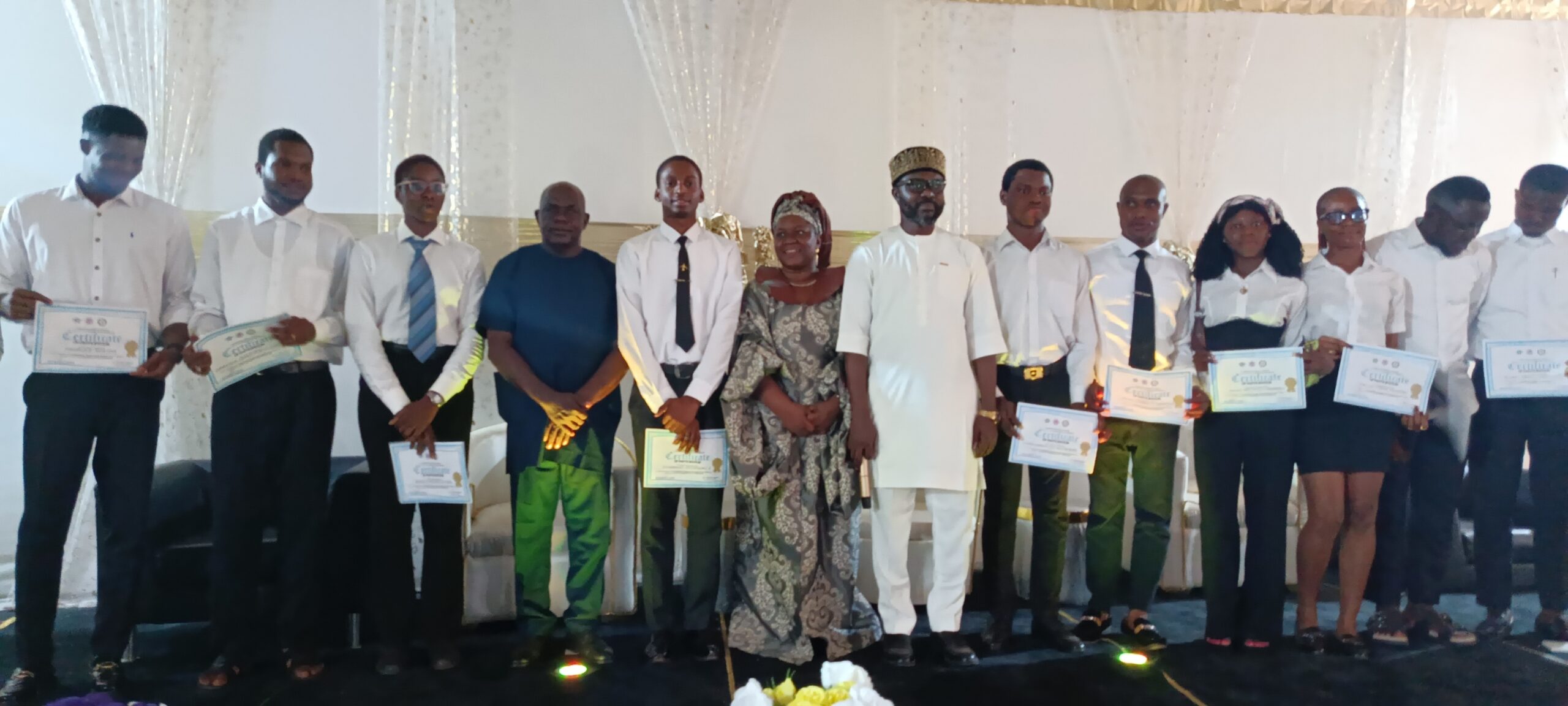
A Call to Action for South-East Youths
As the summit drew to a close, the consensus among stakeholders was clear: the South-East must not be left behind in the rapidly expanding aviation industry. The call was not only for young people to pursue aviation-related training but also to governments, traditional institutions, philanthropists, and private-sector players to provide the necessary support.
Ugwu’s charge to the youths captured the spirit of the event. By embracing aviation, he argued, Igbo youths would not only secure meaningful employment but also contribute to building a self-reliant, globally competitive South-East. Uyammadu’s story, on the other hand, served as a living testament to the opportunities aviation and Eastwing Aviation Institute could offer.
With aviation projected as one of the fastest-growing industries globally, the summit reaffirmed the importance of aviation training in Nigeria, particularly in the South-East. Stakeholders believe that the Eastwing Aviation Institute is positioned to become a regional hub, nurturing talent and preparing the next generation of pilots, engineers, and innovators.
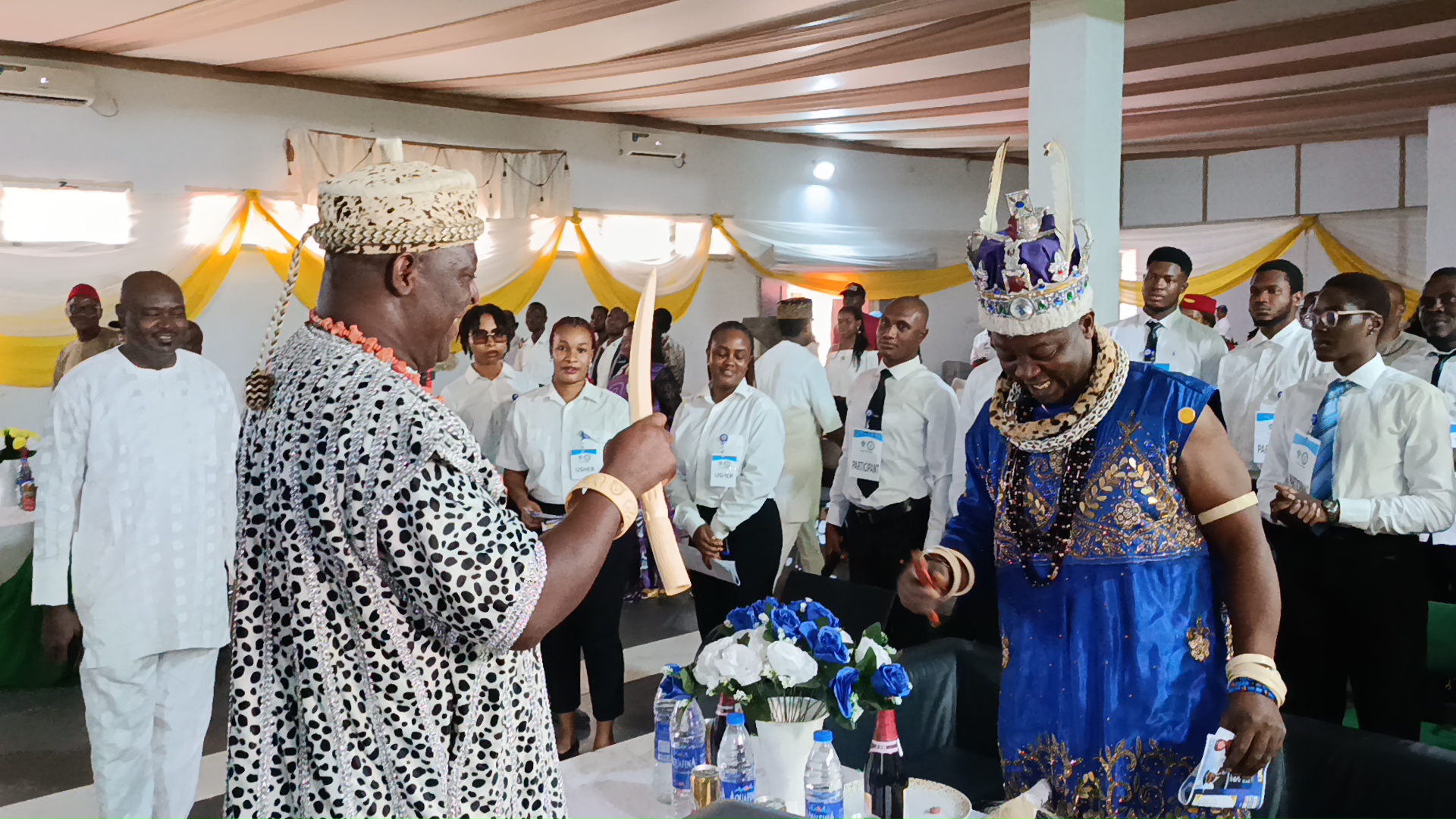
The message to South-East youths was unmistakable: aviation is no longer a distant dream – it is a present reality, and the time to seize it is now. GMTNewsng
-

 News4 years ago
News4 years agoEnugu Community: Bloodbath imminent as traditional ruler plans forceful take over of ancestral land
-

 News4 years ago
News4 years ago2023: Support one of our sons to be governor of Enugu State -Nkanu East leaders plead with other areas
-

 Politics4 years ago
Politics4 years ago2023: Enugu State Governorship slot should go to Nkanu East ~Jim Nwobodo
-

 Opinion4 years ago
Opinion4 years agoBIAFRA, KANU AND NIGERIA
-

 News4 years ago
News4 years agoUgwuanyi an epitome of peace in Enugu State ~Owo Community
-

 News4 years ago
News4 years agoHow Interpol intercepted IPoB leader in Europe
-

 Politics4 years ago
Politics4 years agoEnugu: Nkanu East Leaders’ Forum Kicks Off Consultations For 2023 Governorship Slot
-

 Culture4 years ago
Culture4 years agoEziokwe Amurri Ofala Festival: Prof Jehu Onyekwere, Wife Bag Chieftaincy Titles





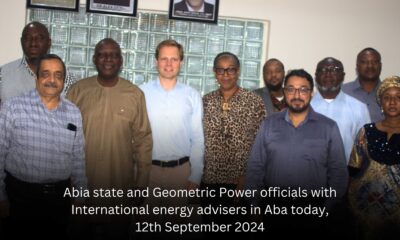
















Chief Joseph Ani
July 16, 2021 at 11:13 am
Congratulations sir in your new age, may God Almighty bless your new age with good health, long life and prosperity in the name of Jesus